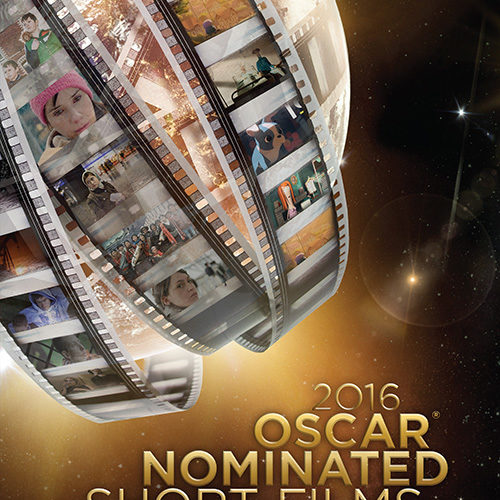Ahead of the Academy Awards, we’re reviewing each short category. See the Documentary section below and the other shorts sections here.
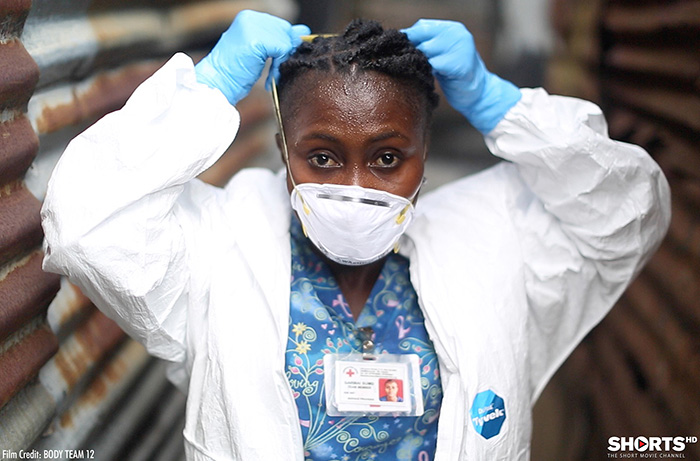
Body Team 12 – Liberia – 13 minutes
For Americans the Ebola scare was a handful of cases and nurses who weren’t as careful as they should have been. To the world it was thousands upon thousands of dead bodies—loved ones that family members can’t normally mourn because every second the deceased’s blood lays in the streets is an extra second risking greater contamination. It’s easy to forget the scope of epidemics like this when ground zero isn’t in our own backyard. We blame countries for being inferior, rejoice in our capabilities to put a lid on things, and go about our daily business as though nothing is wrong. This isn’t the case for citizens of Liberia where outbreak numbers exploded exponentially. It was a plague destroying their country. And it still could return.
Director David Darg‘s film Body Team 12 shines a light on the plight of an environment such as Monrovia, Liberia and the heroes fighting the good fight for their nation’s future. Garmai Sumo isn’t in this job for selfish reasons—she isn’t making a fortune or finding her face plastered on billboards despite being the only female in her “body team”. She’s merely a mother who knows the fear of protecting someone no matter the consequences. She’s a nurse with the know-how to help curb a tragedy sprawling without an end in sight by buckling down to combat it. She’s lost friends as her position on the team rendered her a pariah and liability risking too much to potentially die of the same illness she hopes to end.
The film’s less a story than a snapshot memorial for the dead and living so no one can forget what happened. It’s a showcase of the human spirit and a selfless attitude to do what’s necessary for the greater good because today’s generation deserves the chance to have the same future every generation before them had. It’s also a memorial for the nameless and faceless victims to everyone but their families who must be cremated in order to prevent the disease’s spread. They unfortunately can’t be given a grave without dire ramifications and thus the family mourns with nowhere to point their grief. Darg gives them something with his film by immortalizing them through Sumo’s mission. And one day it’ll all be worth it.
Body Team 12 debuts on HBO in March, 2016.
B
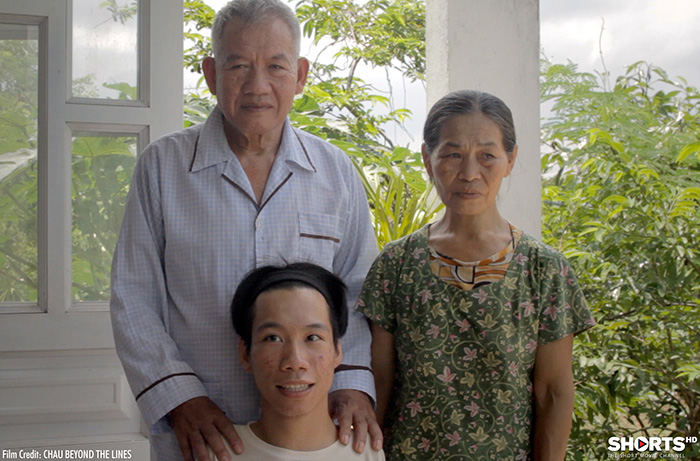
Chau, Beyond the Lines – USA/Vietnam – 34 minutes
Agent Orange still affects the Vietnamese population four decades after its dispersal because it’s taken that long to find a mode with which to begin destroying its remnants. South Vietnam with American help sprayed the herbicide (US Air Force’s own initiative Operation Ranch Hand later continued) looking to take out enemy crops and jungle camouflage. It also contaminated water supplies and food sources for the entire nation so that some estimates are as high as five million dead as a result. The number grows until eradication is complete and not every victim dies. Chau’s disabilities, for instance, stem from his mother drinking river water and exposing him in the womb (his siblings weren’t affected). Despite being dealt this bad hand, he refuses to let it define him.
Courtney Marsh‘s short Chau, Beyond the Lines is a document about humanity’s strength to overcome long odds and constant ridicule. It follows Chau for a few years from his mid-teens at the Lang Hoa Binh Agent Orange Camp in Ho Chi Minh City where his passion for drawing bolstered a dream to become an artist to his time back home in the desolate jungle to his rolling the dice and moving to the city for a go at life independently. Many aren’t able to transcend the obstacles in front of them and find their lives tethered to the secluded camp of their youth forever. And even if the capacity to push forward exists, success isn’t generally found in a vocation as tumultuous and unstable as art.
Chau’s story is therefore an important one because it gives hope to those who don’t believe. His success may not quiet the nurses at the camp from shooting down the dreams of their wards, but it may get the children to ignore the dissent. The film isn’t constructed to simply serve this goal either. It doesn’t look to make Chau a heroic famous celebrity by glossing over the hard work in lieu of easy checkpoints towards a career. We actually see the process of Chau’s work ethic and the amazing progress of his aesthetic. From shaky pencil drawings he needed friends to color due to lack of arm strength to elaborate paintings with precise details created with brush in mouth, the old adage “practice makes perfect” applies.
If you put in the work and conquer your demons, inside and out, your dreams will never die. The end result may not be exactly how you envisioned it, but the journey will discover new and better avenues along the way. Unknown opportunities come out of the woodwork and people who care about you help steer you in the right direction because they see your dedication. There’s a contagious sense of modesty and humility that Chau exudes, one that made him respected by his peers at the camp and the type of person strangers see with hopeful optimism. He may believe it is the luck of the “number 3” and to a point it may be exactly that, but in the end we inevitably make our own luck.
B
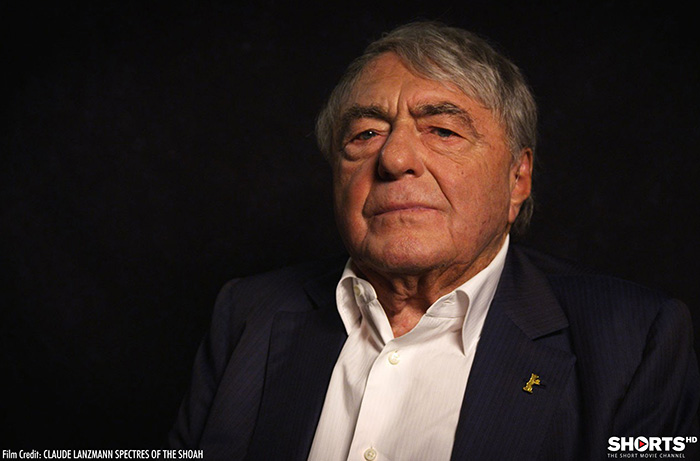
Claude Lanzmann: Spectres of the Shoah – USA – 40 minutes
Claude Lanzmann: Spectres of the Shoah is a document of a documentarian: a time capsule of the twelve-year gestation of what’s possibly the greatest non-fiction works in cinematic history. Shoah‘s a ten-hour look at the Holocaust’s devastation via survivors and perpetrators in varying modes of interview whether out in the open or through hidden cameras, so no one would believe its director if he told Adam Benzine stories about the wonderful experience had during its creation. His was a film about death and anguish—attributes Lanzmann himself felt every single step along the journey. It’s unsurprising to therefore hear about violent interviewees or unplanned suicide attempts because putting such tragedy on film is to live within its horrors amidst the potential you too may succumb to its evil.
Benzine begins his 40-minute behind-the-scenes look with outsiders familiar with Lanzmann and his genius. Marcel Ophüls admits how they used to be friends until Claude’s megalomania got in the way. Could Shoah have been made without a megalomaniac at its back, though? He didn’t even necessarily want the project, but once he accepted the job he took it seriously. A commissioned work that weighed heavily on his mind before agreeing birthed an immense struggle as far as finding a theme and voice with which to capture the essence of mankind’s greatest regret. He can’t be blamed for remembering the burden and responsibility thrust upon him nor the pressure to deliver a two-hour film in two years time despite two hundred hours of footage captured over seven years time.
What’s most intriguing, though, is the mirroring of past and present through Benzine interviewing Lanzmann much the same way he did his subjects. Right after watching the Claude massage Abraham Bomba out of his tear-streaked memory to speak on his personal emotions watching the slaughter of innocents rather than a clinical, detached account, Benzine does the same to learn how dangerous Shoah‘s production was. A story about meeting Heinz Schubert commences wherein Lanzmann and assistant Corinna almost lost their lives. It’s a piece of history I assume never made the final cut thanks to a caption: “previously unseen footage”. But it’s an important detail of Lanzmann’s life and the Holocaust’s saga. It shows the Nazis were cognizant of their crimes and desperate to remain hidden.
This short is an important companion to Shoah because it shows the lengths necessary to find truth while shining a light on the journalistic integrity of documentary which may or may not be so carefully adhered to nowadays with so many projects released each year. Lanzmann was a journalist first and foremost and he approached this project from that vocation’s perspective. He devoted over a decade of his life to give the world an art piece of importance and austere purpose—a beauty even in its representation of a moment in time never to be forgotten. To find truth is never easy and Lanzmann admits his journey was anything but. It almost destroyed him and yet he says it’d have been worth it if it had.
Claude Lanzmann: Spectres of the Shoah debuts on HBO in May, 2016.
B+
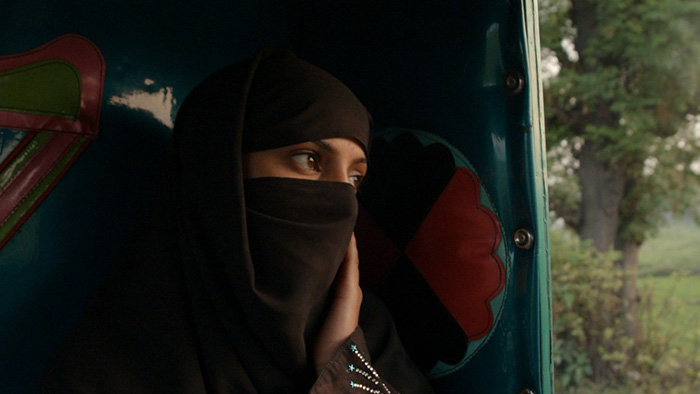
A Girl in the River: The Price of Forgiveness – Pakistan – 40 minutes
When you read that Sharmeen Obaid-Chinoy‘s documentary short A Girl in the River: The Price of Forgiveness concerns a Pakistani girl shot and left for dead who survived to become a beacon of strength and bravery, do not simply dismiss it as “just like Malala Yousafzai.” While similarities do exist, the two couldn’t be farther apart in their contextual meaning above serving as two examples that prove women are treated as worse than second-lass citizens around the world. Malala is an educated activist who was targeted by an ignorant stranger years after she began her crusade. Saba Qaiser—Obaid-Chinoy’s subject—on-the-other-hand is a nineteen-year old who was kidnapped and taken to a shallow river by her father and uncle as the would-be victim of an honor killing.
Yes, an honor killing. The concept is laughable to an American, an incongruous oxymoron that shouldn’t exist as a phrase in any way, shape, or form. Surprisingly, some in Pakistan agree as evidenced by criminal investigator Ali Akbar, the policeman in charge of the crime scene where Saba miraculously rose from the water to flag down help at a near-by gas station. To him this was attempted murder, the predator being a family member only making matters worse despite some in Saba’s village deluding themselves into believing it justifies the act. He hopes a woman survivor of such an atrocity will prosecute her assailant and force him to rot in jail. The issue sadly proves impossibly complex once we realize how justice is often upheld outside the courts.
Obaid-Chinoy’s film depicts Saba’s ordeal from her cheek getting stitched back together to the present sense of “safety” after the drama’s insanely backwards journey finishes. We hear her continuously explain how she’ll never forgive her father and uncle for what they did and know it to be truth, but that’s merely the human element of this reality. There’s a political one too, one of which community elders (all male) expertly hide behind passages in the Quran seemingly giving their Y-chromosome absolute power. Listening to Saba’s father’s justification for his actions is to fear for mankind because his mind is a scary machine to fathom. But don’t let it condone bigots calling Islam evil. This film does well to show man as villain, twisting religion for his whims.
What’s worse is that very little can be done since the country’s laws allow it. Prosecuting the guilty in Pakistan for a crime like honor killing—wherein the family murders a female member causing its name “disrespect” to the tune of one thousand-plus victims per year—is actually the worst thing survivors can do. The village wants peace and its men want power. Prosecute and you will be disrespected. Compromise and you will be forgiven for your so-called transgression. While the latter is the closest thing to securing your not being assaulted again, however, it also legitimizes the assailants’ actions. Suddenly it becomes community-sanctioned to reclaim your honor through murder: kill and earn a reprieve. God may intervene on the girl’s behalf, but you’ve done no harm.
A film like this angers you past the threshold of common sense. It angers you because it forces your acknowledgment of living in a world where places still exist that hold some lives less precious than others. It opens your eyes to the travesties happening internationally, but also those within your own borders. There’s unfortunately a culture in the Muslim community that breeds disgusting habits in those broken enough to embrace them. But that isn’t the religion’s fault. As Saba says, her father swearing on the Quran assuaged her fears. He blasphemed. He wasn’t killing in Allah’s name; he was killing in his own. And every time some lunatic in America does harm to an innocent Muslim citizen, it’s the same. Murder is murder—nothing should be simpler.
A
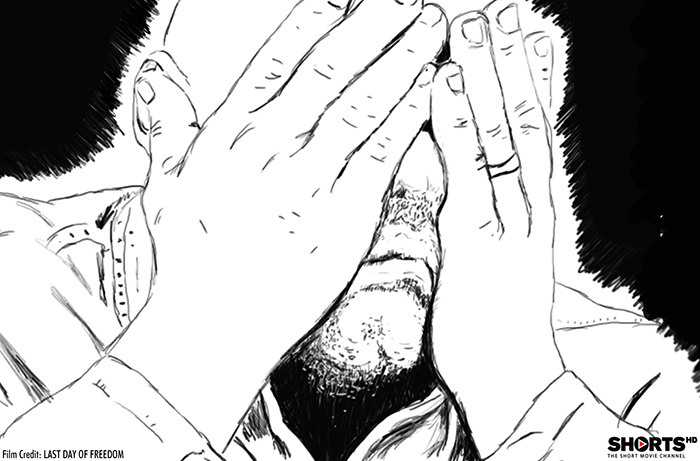
Last Day of Freedom – USA – 32 minutes
Directors Dee Hibbert-Jones and Nomi Talisman have quite the story on their hands thanks to the bravery of Bill Babbitt to allow his catharsis to be captured in a public forum such as film. A religious and loving man who watched his younger brother Manny leave for Vietnam after a troubled adolescence, Bill always saw hope. With two tours, myriad injuries, and a diagnosis of paranoid schizophrenia later, however, Manny’s trouble had just begun. He was coping with this new life back in the States away from the violence of war, but sadly we’re talking about the late-70s and early-80s before PTSD became a legitimate concern for veterans. No one was equipped to help him when flashbacks hit and suddenly there was nowhere left to go.
The entire film is an interview session wherein Bill relays the story of Manny and what happened to set him on a course with fate in 1980. He isn’t making excuses for his brother or himself; he’s merely setting the record straight with facts from his perspective as a man led astray by the system. To hear him speak of Manny and the man he was is to see someone you know and love that got a raw deal in life and needed help. When the world doesn’t want to confront the issue, though, there’s often little to be done. So what do you do upon discovering tragedy occurred by his hands? Do you “help” him escape the consequences or do you trust justice will treat him right?
Bill chose the latter and he expresses the anguish that doing so provided. As tough a decision it was, however, he also acknowledges he had no choice. What’s to say another incident didn’t occur wherein Manny harmed a family member or a neighbor? What’s to say a car engine backfiring didn’t trigger a fight or flight mentality while playing with nieces and nephews like it had with his son years previous? Doing the right thing is ultimately the only choice we’re given because the other route renders the consequences of our own actions as deplorable as the initial event. Bill had a duty to himself, his community, and his brother to tell the truth and let the repercussions be felt. Manny simply wasn’t in his right mind.
It’s a tragic tale of agony and woe that somehow gets more excruciating as it continues. Because while Last Day of Freedom is about Bill’s compassionate actions and Manny’s heroic life marred by mental illness and an unforgiveable mistake, there’s still a place for the court system to be vilified for its faults too. Hearing about his lawyer’s ineptitude, the political climate concerning the death penalty pulling strings, and the complete lack of respect for PTSD as a reality will make you sick. It’s amazing that through it all Manny somehow remains alert, remorseful, and charitable. Reading about what he did for his last meal during the end captions shows how even convicted murderers can provide us a glimmer of hope for the future.
I only wonder how much more affecting it would be without the animation. There’s charm to the rotoscoping of minimal lines and colors scrawled above the footage, but I don’t see a purpose to the aesthetic decision. Using this effect allows imaginative room to maneuver scenes where they can’t actually go and yet the filmmakers never put anything onscreen real life couldn’t already do itself. Some rotoscoping looks like a Photoshop filter that begs asking what the artistic point even was. Use stock clips from Vietnam, throw family photos of Bill and Manny up, and show the former’s authentic emotions build without filter. The animation becomes as a barrier, distancing us from his humanity and that’s the exact opposite of what should be happening.
B
The Oscar Nominated Shorts are in limited theatrical release starting January 29th. See the official site for more details and our reviews of the other shorts sections here.

